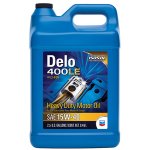My 225 just turned 1700 hours so it’s 100-hour maintenance time again.
So I drove the hour to my original dealer to buy various filters, O rings and so forth. These folks have been Honda dealers for many, many years, and now are also a Yamaha dealer. They have a large operation with several full time marine mechanics on permanent staff and an absolutely great parts department. They have always been highly trustworthy and have done excellent work on my engines, although they are certainly not cheap – you get what you pay for.
I asked the owner what oil they were recommending these days. To my utter surprise, they are now using and recommending the Mercury SAE 25W-40 in all of their big outboard engines (NMMA FC-W [Catalyst Compatible].) I asked why they were doing that. He explained that they have been tracking engine failures for over 10 years now and that around 15% of them have had major failures, mostly due to lubrication problems. They finally figured out that a lot of owners were putting up their boats in early fall and not re-launching until late spring. Even though they are mostly doing the right things for long term storage, they were starting their engines dry of lubricant because all of it had drained into the pan leaving no residual lubrication on the bearings and thrust points.
This seemed to make sense to me, given how the engine is oriented vertically and the number of revolutions it would typically take to get oil to all of the required areas at initial startup – bearings, cylinder walls, rings, cam, rocker arms, etc. It also is a good explanation of why the frequent users, like the USCG, commercial fishermen, and year-round recreational fishermen have few problems with their big engine Hondas and get many thousands of hours out of them.
Anyway, according to him, the Mercury SAE 25W-40 supposedly stays on the bearings, rings, rockers, etc. longer and leaves more of a residual lubricant over a longer period of time. He cites evidence that the failure rates due to lubrication issues have dropped significantly since they have switched over. (I suspect that any top notch marine-specific SAE 25W-40 would do the same thing.)
This observation MAY also make the case for those oils that claim to provide a more permanent residual coating to critical surfaces, like Castrol GTX MAGNATEC, AMSOIL, NanoLub, and so forth.
As a side note, remember that a 25W-40 oil initially flows somewhat slower than a 10W-40 oil at initial “cold” start up. Also note that marine engines, especially outboards, seldom get to the same operating temperatures as an auto engine (approximately 200 F), so in this case the viscosity rating of “40” is seldom attained with an outboard.
Just thought I would pass this along for consideration.
So I drove the hour to my original dealer to buy various filters, O rings and so forth. These folks have been Honda dealers for many, many years, and now are also a Yamaha dealer. They have a large operation with several full time marine mechanics on permanent staff and an absolutely great parts department. They have always been highly trustworthy and have done excellent work on my engines, although they are certainly not cheap – you get what you pay for.
I asked the owner what oil they were recommending these days. To my utter surprise, they are now using and recommending the Mercury SAE 25W-40 in all of their big outboard engines (NMMA FC-W [Catalyst Compatible].) I asked why they were doing that. He explained that they have been tracking engine failures for over 10 years now and that around 15% of them have had major failures, mostly due to lubrication problems. They finally figured out that a lot of owners were putting up their boats in early fall and not re-launching until late spring. Even though they are mostly doing the right things for long term storage, they were starting their engines dry of lubricant because all of it had drained into the pan leaving no residual lubrication on the bearings and thrust points.
This seemed to make sense to me, given how the engine is oriented vertically and the number of revolutions it would typically take to get oil to all of the required areas at initial startup – bearings, cylinder walls, rings, cam, rocker arms, etc. It also is a good explanation of why the frequent users, like the USCG, commercial fishermen, and year-round recreational fishermen have few problems with their big engine Hondas and get many thousands of hours out of them.
Anyway, according to him, the Mercury SAE 25W-40 supposedly stays on the bearings, rings, rockers, etc. longer and leaves more of a residual lubricant over a longer period of time. He cites evidence that the failure rates due to lubrication issues have dropped significantly since they have switched over. (I suspect that any top notch marine-specific SAE 25W-40 would do the same thing.)
This observation MAY also make the case for those oils that claim to provide a more permanent residual coating to critical surfaces, like Castrol GTX MAGNATEC, AMSOIL, NanoLub, and so forth.
As a side note, remember that a 25W-40 oil initially flows somewhat slower than a 10W-40 oil at initial “cold” start up. Also note that marine engines, especially outboards, seldom get to the same operating temperatures as an auto engine (approximately 200 F), so in this case the viscosity rating of “40” is seldom attained with an outboard.
Just thought I would pass this along for consideration.


